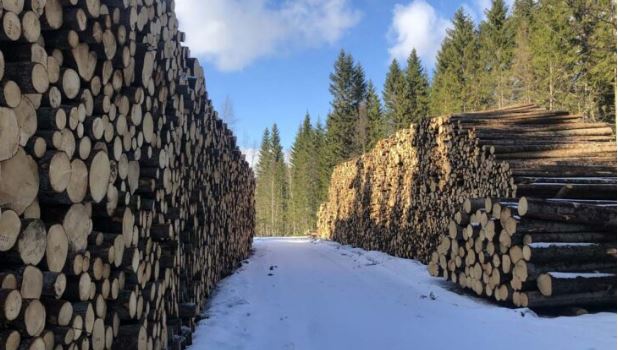
Norway's forestry industry experienced a record year in 2024.
According to the Norwegian Directorate of Agriculture, 11.97
million cubic metres of wood were sold for industrial purposes -
more than ever before. The gross value of this timber harvest
was over NOK 8 billion (equivalent to around EUR 680 million),
an impressive increase of 33 per cent compared to 2023.
The Norwegian timber industry
High demand from international timber processors fuelled
deforestation in Norway .
Historic peak values
The harvest volume exceeded the previous record from 2021 by
336,000 cubic metres. Trond Svanøe-Hafstad, Head of Department
at the Norwegian Directorate of Agriculture, attributes the
record result to several factors :
¡®The high demand for wood, rising prices and favourable weather
conditions in the winter of 2024 have contributed significantly
to this development.¡¯
Rising prices fuel deforestation
Timber achieved unprecedented prices in 2024. The average price
per cubic metre rose from NOK 602 in January to NOK 762 in
December. Both sawlog and pulpwood prices increased
significantly over the course of the year. The global timber
market was also tense, driven by a shortage of raw materials as
a result of bark beetle damage in North America and Europe and
the suspension of Russian timber exports.
Exports and competition in volatile markets
International demand for Norwegian timber increased
significantly. Industries at home and abroad increased their
production and contributed to the shortage of wood as a raw
material.
¡®We are seeing that the industry is paying increasingly higher
prices in order to secure the necessary raw materials in a
competitive market,¡¯ explains Svanøe-Hafstad.
Background to the statistics
The figures published by the Directorate of Agriculture
relate exclusively to industrial round timber. Firewood, wood
chips and Christmas trees are not included in the statistics.
However, the inclusion of energy assortments is a new addition:
605,000 cubic metres of wood that can be used for energy were
recorded in 2024; this data is to be regularly included in the
statistics from 2025.
Source: nordisch.info